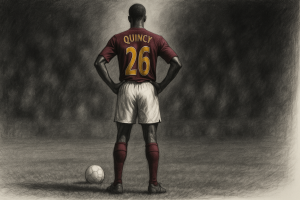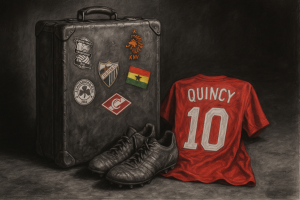Football is a game of destiny. Of prodigious talent, whispered legends, and the tantalising scent of what might have been. Some players glide seamlessly from prodigy to powerhouse. Others dance to a different rhythm. Quincy Owusu-Abeyie was one such dancer—lightning in his boots, rebellion in his soul.
Born in Amsterdam, a city synonymous with footballing artistry, he was nurtured in Ajax’s famed academy, where the game is sculpted as much as played. But Quincy was never one for convention. The whispers of discontent grew louder, and then, suddenly, the unthinkable—Ajax let him go.
His story could have ended there, another unfulfilled spark. But fate intervened. North London beckoned. Arsenal’s Liam Brady saw not a problem, but a possibility. A trial. A chance to begin anew.
Would this be the beginning of something truly special? Or merely a prelude to a story that would slip through the cracks of history?
A Thunderbolt in the Academy – The Birth of a North London Enigma
Football is a series of moments. Blink, and you might miss a flicker of brilliance. For Arsenal’s youth teams in the early 2000s, Quincy Owusu-Abeyie was that flicker—a force of nature, dazzling yet unpredictable.
He wasted no time in announcing himself. The 2002–03 season was his stage. Seventeen goals in twenty academy games. And then, a match that became folklore—six goals in a 7–1 demolition of Wolves. A statement of intent.
But football is not just numbers. It is about how a player makes you feel. And Quincy—oh, Quincy—made you feel alive. His touch was velvet, his acceleration explosive. He didn’t just dribble past opponents; he humiliated them, turning defenders into bystanders.

Then came the moment every young footballer dreams of. A night under the Highbury lights. October 2003, League Cup, Rotherham United. An 18-year-old Quincy stepped onto the pitch. Extra time. A penalty shootout loomed. And fate, ever the dramatist, wrote a cruel twist. Quincy, so full of bravado, so fearless, stepped up to strike the winning penalty. A hush. A heartbeat. A miss.
Arsenal prevailed, and his talent was undeniable. His promise, electric. On his 18th birthday, he was handed a professional contract. A gift. A statement.
Yet, in the distance, storm clouds gathered. Because for all his brilliance, Quincy Owusu-Abeyie was a restless spirit. A battle between talent and temperament.
For now, Arsenal had a star in waiting.
If only he was willing to wait for them, too.
At Arsenal, the tide was turning. Bergkamp neared his final descent. Thierry Henry was hearing the siren call of Barcelona. Change was coming.
It should have been Quincy’s moment. But the boardroom door swung open. Emmanuel Adebayor arrived. Theo Walcott followed. The path narrowed. Quincy waited. But waiting does not make the team sheet.
Wenger, the master sculptor, saw something in Quincy—something raw, something thrilling—but not something essential. Not yet. And in football, “not yet” too often means “never.”
The stage that once seemed his for the taking was shrinking. A restless soul stirred. The North London night was closing in.
The Wanderer’s Path – A Nomad in Search of a Home
Football at the elite level, the promised land. Bright lights, bigger dreams. But for every chosen one, there are those who drift. Quincy Owusu-Abeyie was one such wanderer.
The red of Arsenal faded. Another shade of red called his name—Spartak Moscow. A club steeped in history, in passion, in the bitter chill of Russian winters. A chance to rewrite his destiny.
But Moscow is no home for the uncertain. It is a city of steel, of football played with a warrior’s heart. One moment, Quincy was a flourish of skill, a goal that defied physics. The next, a flicker of frustration, a sulking silhouette. A player who burned bright but never quite burned steady.

From Russia, the journey unravelled like a restless melody. Málaga. Birmingham. Panathinaikos. Promise, flashes, moments—and then, the silence.
He was a ghost of what might have been. A talent unbridled, untamed, and ultimately unfulfilled. His boots touched the grass of a dozen lands, yet nowhere did they plant roots deep enough to hold.
And so, Quincy Owusu-Abeyie, the boy who once danced through defences, now danced away from football itself. The game had given him everything.
And yet, in the end, he chose to walk away.
The Encore – From Football Boots to Spitting Bars
Football had given him a stage. Floodlights, roaring crowds, the promise of something eternal. But Quincy was never one to be confined. The game had been a love affair—passionate, intoxicating, but never quite enough. And so, when the final whistle blew, he did not mourn what could have been.
He turned the page.
Football had been his first language. Music would be his second.
They called him Blow now. A name carrying the same swagger, the same edge. The boy who left defenders sprawling now left beats trembling beneath his flow. The rhythm had changed, but the movement? The movement was still his own.
He spoke of freedom. Of escape. Of a game that thrilled him but never truly owned him. The hunger that fuels the very best had never consumed him the way it did others. And so, he stepped away—not in bitterness, not in regret, but in pursuit of something truer.

A microphone in place of a ball. A studio in place of a stadium. And beneath the basslines and the lyrics, you can still hear it—that flicker of genius, that defiant streak, that untamed spirit.
Quincy Owusu-Abeyie never belonged to football.
Not really.
The Legacy – A Name the Streets Still Whisper
The walls of Highbury gave way to a journey that spanned continents but never quite found a home. The boy who made defenders look foolish, who made the impossible feel routine, slipped into the shadows. The talent was never in doubt. The trajectory? That was another story.
But in football, there are those who belong to the trophies, and there are those who belong to the streets. And the streets, oh, they do not forget. The ones who made you leap from your seat, who played without a care for consequence.
And then, Quincy. A blur of stepovers. A player who played as if the world was watching, even when the world had moved on.
He was never Henry. Never Bergkamp. Never van Persie. The Emirates faithful do not sing his name. His shirt does not hang from the rafters.
And yet, ask those who remember. They will smile. They will nod.
Because Quincy Owusu-Abeyie was not a champion.
He was something else entirely.
A firework. A fleeting star.
Victoria Concordia Crescit
